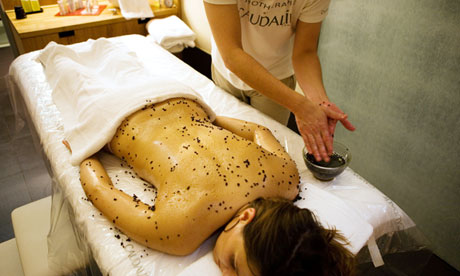
There have been many different studies into the health benefits of wine. Governments have run programmes that have lasted for decades, examining the "outcomes" of large populations to see whether occasional tipplers live longer than abstainers or vice versa. Scientists have isolated chemicals found in red wine such as procyanidins and resveratrol, to establish whether they do have the benefits that have been claimed for them.
I've taken a different tack. I'm in La Rioja in Spain, at the Frank Gehry-designed Marqués de Riscal "Vinothérapie" spa hotel, having the raw ingredients of wine, including whole grapes, kneaded gently into my flesh. I've never been to a spa before but who could resist the offer of a free session of a massage called "pulp friction"?
If there's one thing that puts you into a relaxed, blissful state of mind it's a pun on a Quentin Tarantino film. However, my reverie about a range of Reservoir Dogs aromatherapy treatments is interrupted by concerns about the effects of the more conventional "vinotherapy" that I've been trying here in La Rioja.
Over the past two days there were a couple of glasses of Remírez de Ganuza Reserva 2006 at a restaurant in nearby village Guardia, then trips to the wine palaces of Protos, Ysios and Portia. Even the 80-cents-a-glass "vino joven" on Calle Laurel in Logroño should, technically, be added to my units. I've not quite been binge drinking, but neither have I been sticking to the recommended limits. And although it's been over 20 years since the evidence of the "French paradox" sent sales of red wine soaring, it's still not entirely clear that the Gallic approach to alcohol is necessarily the way to live for ever. The evidence in the press is, to say the least, mixed.
After returning from La Rioja, then, I speak to experts on both sides of the argument, starting with ex-barman Alex Kammerling. He's now best known for creating the Kamm & Sons ginseng spirit, but he also gives regular talks about the history of alcohol as a medicine.
"It all depends on the dosage," he says. "There's a whole load of research from the last 10 to 20 years that shows if you drink alcohol it helps reduce heart attacks. Heart disease is the number one killer in the UK so anything that helps reduce that is fantastic. I saw a link that said, in America, because there's such a massive heart disease problem, if everyone stopped drinking there'd be 80,000 more deaths."
Alex's source is a New York based professor of sociology, David J Hanson, who has, for the past 30 years, argued that we underestimate the benefits of alcohol and overestimate the risks. However, when I send his paper to Professor Paul Wallace, chief medical adviser for Drinkaware, he's unconvinced.
Professor Wallace agrees that incidence of coronary heart disease, even if you correct for social class and other factors, follows a "J-shaped curve", where abstainers from alcohol have a higher risk than moderate drinkers (although nowhere near as bad as heavy drinkers) but he also points out that there's more to life (and death) than just your heart.
"If all we had to worry about was cardiovascular disease and people didn't get cancer or dementia then you could say that the optimum thing to do would be to have one or two drinks a day," he says. "The same relationship is not true for the other arguments. What happens with most of those other things, such as cancer, risk goes up with consumption. There's no question that the way we're currently handling alcohol as a society is vastly more harmful than it is beneficial."
Indeed, the abuse of alcohol has caused a 25% increase in deaths from liver disease in the UK in under a decade. But although the evidence may be confusing, most of us get fairly clear messages about the effects of alcohol from our own bodies. Wine and other drinks, at their best, don't only taste really nice, they make us happy and sociable: states that are proven to be good for our health. At their worst they make us ill, angry, depressed and liable to do things that we'll regret.
"Alcohol is certainly used by most people most of the time in a socially beneficial way," says Wallace. For the rest of the people, the rest of the time, perhaps Vinothérapie has the answer. You can do anything you like with wine, just as long as you don't actually drink the stuff.

